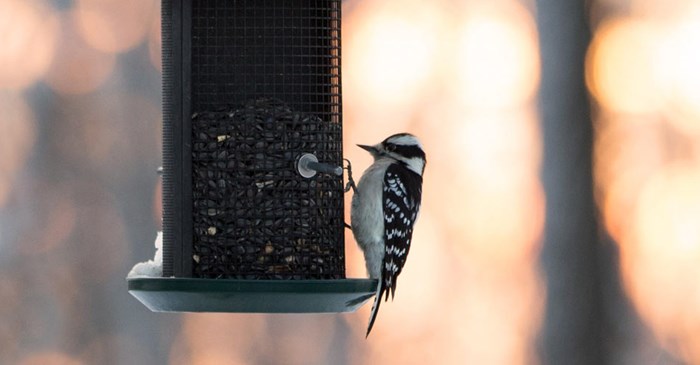During the colder months, filling our bird feeders keeps us connected to nature when we least want to spend time outdoors. If you’re new to the practice, you’ll want to keep your feathered friends as safe as possible. Here are three bird feeding tips to keep in mind:
1. Never "grease" bird feeder poles
While some don’t mind sharing their birdseed with squirrels, others are always on the lookout for the latest squirrel-proof solutions. But using petroleum jelly or any other greasing agent on your bird feeder poles is a big no-no. Yes, it does stop squirrels from climbing. But if a bird happens to bump into it during a feeding, the results can be disastrous for their plumage. Birds need their feathers to help them fly, and the structure and naturally occurring oils in feathers are designed to protect their bodies against the cold and wet. When feathers get matted down by a slick of petroleum jelly, they can’t function. Instead of using petroleum jelly to deter squirrels, install a baffle, or follow this three-step process.
2. Don’t skip feeder cleanings, even in winter
When birds flock to feeding stations, harmful germs can easily get passed from bird to bird, making them sick. House Finch eye disease (Mycoplasmal conjunctivitis) spreads quickly, infecting House Finches, American Goldfinches, Evening Grosbeaks and Purple Finches with swollen, crusty eyes. While some birds recover, it can cause blindness in others.
Maintaining a safe, healthy environment is one thing you can do to prevent the spread of this and other diseases. Even in the winter, you should be on guard against spoiled seeds and disease-harboring droppings left at the feeder, according to the Cornell Lab of Ornithology. Every month or so — or when you see a bird at the feeder that appears sick — you’ll want to clean and disinfect your feeders. First, discard the old seed. Then disassemble the feeder, and scrub with a nylon bristle brush with hot, soapy water. Rinse, and submerge the feeder in a diluted bleach solution. After air-drying, reassemble and fill with fresh feed.
3. Don’t store open bags of birdseed
Birdseed’s long shelf life makes for easy storage. But when not done properly, it can do more harm than good. Mice and other pests, for one, can be drawn to the scent of sunflower seeds, peanuts and other tasty morsels in the mix. That’s especially true in the colder months when mice head indoors and take up residence in garages, garden sheds, and basements. Moisture can also easily get inside an opened bag of seed, causing mold and early spoilage that can sicken the birds. To protect your wild bird food mix and keep it fresher longer, store it in an airtight, lidded container.
It's always a good feeding practice to opt for a high-quality brand of wild bird food. Lyric Supreme Wild Bird Mix is filler-free and chock full of nuts, sunflower seeds, and many other tasty morsels to please your feathered friends.
